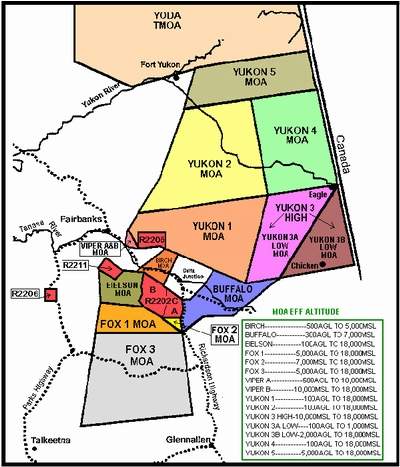Tue, May 13, 2003
Dependable, Yet Solar/Wind Powered
The US Air Force has decided to use ARINC to develop two remote
Very High Frequency (VHF) air/ground radio stations in central
Alaska. The project will improve voice communications over two
sections of the Air Force's huge Pacific Alaskan Range Complex
(PARC), which covers some 67,000 square miles.

Because electricity is not available, the facilities will need
to include alternative energy sources-either wind or solar-to power
the transmitting and receiving electronics.
One of the new VHF station locations has been specified by the
Air Force: Snowy Peak, located north of the Yukon River about 150
miles east of Fairbanks. The station at this site will improve
radio coverage of the Yukon MOA. The second station will serve the
Fox MOA, about 100 miles south of Fairbanks. The precise location
for the second transceiver station will be determined after
engineering surveys. One or more repeater stations may also be
needed to relay signals to the new remote sites.
"ARINC is proud to help the Air Force add new, reliable radio
coverage that will extend their communications envelope," stated
Walter "Bud" Elsaesser of ARINC Global Maintenance Services. "We
have designed and installed more than 1,000 air/ground radio
stations around the world, including stations on Russian
mountaintops using solar electric power and deep cycle batteries
for year-round operation."

Creating An Alaskan Comm Network
The new stations will join four older VHF air/ground radio
facilities on a network operated by the 353rd Combat Training
Squadron at Eielson Air Force Base outside Fairbanks. One of
ARINC's subcontractors for the work is Alaska Weather Operations
Services, Inc.

"We have a long and successful relationship with Alaska Weather
Operations Services," stated Mr. Elsaesser. "AWOS provides
maintenance and installation as well as shelter construction for
our varied needs in Alaska. Their local knowledge and proven
environmental concern, as well as their history of shelter
construction for the Alaska environment are unrivaled."
Alaska has more private and small commercial aviators per capita
than any other state, and maintaining the safety of flight during
military exercises is an important consideration. When air and
ground exercises are held at PARC, the Air Force's VHF voice radio
system broadcasts advisories and provides aircraft position
information for both military and civilian aircraft.
More News
Terminal Radar Service Area Airspace surrounding designated airports wherein ATC provides radar vectoring, sequencing, and separation on a full-time basis for all IFR and participa>[...]
Very High Frequency (VHF) The frequency band between 30 and 300 MHz. Portions of this band, 108 to 118 MHz, are used for certain NAVAIDs; 118 to 136 MHz are used for civil air/grou>[...]
“From approximately November 2021 through January 2022, Britton-Harr, acting on behalf of AeroVanti, entered into lease-purchase agreements for five Piaggio-manufactured airc>[...]
Also: Virtual FLRAA Prototype, IFR-Capable Autonomous A/C, NS-32 Crew, Golden Dome Missile Defense Bombardier announced that the first production Global 8000 successfully completed>[...]
Aero Linx: The 1-26 Association (Schweizer) The Association’s goal is to foster the helpfulness, the camaraderie, and the opportunity for head-to-head competition that is fou>[...]
 ANN's Daily Aero-Term (05.29.25): Terminal Radar Service Area
ANN's Daily Aero-Term (05.29.25): Terminal Radar Service Area ANN's Daily Aero-Term (05.30.25): Very High Frequency (VHF)
ANN's Daily Aero-Term (05.30.25): Very High Frequency (VHF) Aero-News: Quote of the Day (05.30.25)
Aero-News: Quote of the Day (05.30.25) Airborne 05.23.25: Global 8000, Qatar B747 Accepted, Aviation Merit Badge
Airborne 05.23.25: Global 8000, Qatar B747 Accepted, Aviation Merit Badge ANN's Daily Aero-Linx (05.30.25)
ANN's Daily Aero-Linx (05.30.25)




